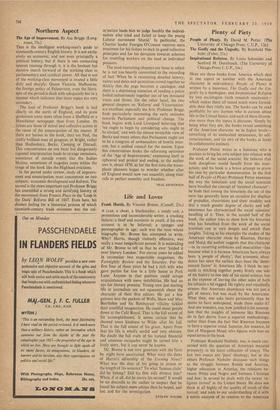Northern Aspect
The Age of Improvement. By Asa Briggs. (Long- mans, 35s.)
This is the intelligent working-man's guide to nineteenth-century English history. It is not exclu- sively an economic, and not even principally a political history, but if there is one connecting interest running through it, it is the hesitant but decisive march forward of the working class to parliamentary and syndical power. All that is not of the working-class movement is treated a little drily and sharply; Queen Victoria, Melbourne, the foreign policy of Palmerston, even the litera- ture of the period is dealt with adequately but in a manner which indicates that these topics are very secondary.
The keel of Professor Briggs's book is laid clearly on the north of England, and its press quotations come more often from a Sheffield or a Manchester newspaper, than from London. Its values are those of moral and collective action in the cause of the emancipation of the masses. If there are heroes in the book, they are Peel, the coldly brilliant man of progress, or Bright, rather than Shaftesbury, Burke, Canning or Disraeli. This concentration on one basic but dangerously regional interpretation leads to strange omissions, sometimes of outside events like the Indian Mutiny, sometimes of tragedies more within the range of the book like the Highland evictions.
In the period under review, study of improve- ment and emancipation must concentrate on two subjects : economic development and Reform. The second is the more important and Professor Briggs has assembled a strong and satisfying history of the movement from Francis Place to the 'Leap in the Dark' Reform Bill of 1867. Even here, his distinct feeling for a historical process of which twentieth-century trade unionism was the cul- [reflation leads him to judge harshly the individ- ualists who tried and failed to keep the young Labour movement 'liberal.' In particular, the Chartist leader Feargus O'Connor receives stern treatment for his failure to stick to good collective principles and for his deviation towards schemes for resettling workers on the land as individual peasants.
The most interesting chapters are those in which he is not too heavily committed to the recording of fact: When he is recounting detailed history, names and dates and quotations crowd together so thickly that the page becomes a catalogue, and there is a depressing sensation of reading a précis boiled industriously together out of ten thousand tracts and theses. On the other hand, the two general chapters on 'Reform' and 'Victorianism' are excellent, especially the first. Professor Briggs finds particularly interesting the early attitudes towards Parliament and political change. The book begins with Lord Liverpool believing that 'we ought to begin by considering who ought to be elected,' and with the almost invincible view of Burke and many others that Parliament ought not to be a congress of ambassadors of hostile inter- ests, but a unified council for the nation. Upon this conservatism broke the reforming optimism of the 'Age of Improvement,' expressing itself in upheaval and protest and ending, as the author sees it, about 1870, as for the first time the trium- phant planners began to wonder whether after all England would now run smoothly along their rails to perfect morality and freedom.
NEAL ASCHERSON


































 Previous page
Previous page